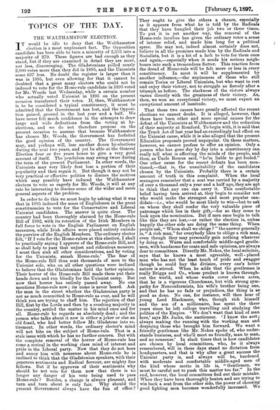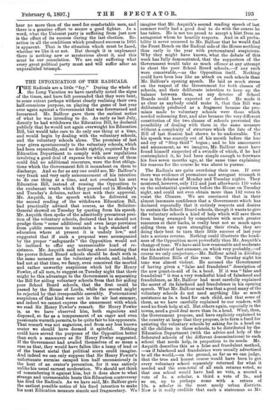TOPICS OF THE DAY.
THE WALTHAMSTOW ELECTION.
IT would be idle to deny that the Walthamstow election is a most unpleasant fact. The Opposition candidate has been able to turn a minority of 2,353 into a majority of 279. These figures are bad enough as they stand, but if they are examined in detail they are more, not less, discouraging. The Gladstonians polled nearly 2,000 votes more than they did in 1895, and the Unionists some 637 less. No doubt the register is larger than it was in 1895, but even allowing for that it cannot be doubted that a great many electors who could not be induced to vote for the Home-rule candidate in 1895 voted for Mr. Woods last Wednesday, while a certain number who actually voted Unionist in 1895 on the present occasion transferred their votes. If, then, Walthamstow is to be considered a typical constituency, it must be admitted that the Government has lost, and the Opposi- tion gained, ground in the last year and a half. We have never felt much confidence in the attempts to draw large and wide deductions from the voting at by- elections, and we do not therefore propose on the present occasion to assume that because Walthamstow has chosen Mr. Woods, the Government has forfeited the good opinion of the country. The Government may, and perhaps will, lose another dozen by-elections during the next two years, and yet be able at the General Election four or five years hence to give a very good account of itself. The pendulum may swing twice during the term of the present Parliament. In other words, the Unionists may very likely first lose a portion of their popularity and then regain it. But though it may not be very practical or effective politics to discuss the motives which may possibly have induced the Walthamstow electors to vote so eagerly for Mr. Woods, it will at any rate be interesting to discuss some of the wider and more general aspects of the problem.
In order to do this we must begin by asking what it was that in 1895 induced the mass of Englishmen in the great constituencies to vote for the Conservative and Liberal Unionist candidates. The answer is quite clear. The country had been thoroughly alarmed by the Home-rule Bill of 1892, with its retention of the Irish Members in full force to vote in the English Parliament on English measures, while Irish affairs were placed entirely outside the purview of the English Members. The ordinary elector felt, If I vote for the Home-rulers at this election, I shall be practically saying I approve of the Home-rule Bill, and so shall help to pass that unjust and ridiculous measure. I must then sink all other considerations, and by voting for the Unionists, smash Home-rule.' The fear of the Home-rule Bill thus sent thousands of men to the Unionist side, who on all other questions were inclined to believe that the Gladstonians held the better opinion. Their horror of the Home-rule Bill made them put their heads down and run blindly for the Unionist camp. But now that horror has entirely passed away. No one mentions Home-rule now ; its name is never heard. Ask the man in the street whether the Gladstonian party is not as much committed to Home-rule as ever, and he will think you are trying to chaff him. The rejection of that Bill, first by the Lords and then by a crushing majority in the country, settled the matter in his mind once and for all. Home-rule he regards as absolutely dead ; and the person who talks about it now is either a joker or else an old fossil, who had better follow Mr. Gladstone into re- tirement. In other words, the ordinary elector's mind will not bite on the subject of Home-rule. That is a stale issue with which he has no further concern. But with the complete removal of the horror of Home-rule has come a revival in the working class mind of interest and pride in the Liberal party. Now that they do not bore and annoy him with nonsense about Home-rule he is inclined to think that the Gladstonian speakers, with their generous sentiments and Radical fervour, are mighty fine fellows. But if he approves of their sentiments why should he not vote for them now that there is no longer any danger of his vote being used to pass Home-rule ? Besides, a change is always pleasant, and turn and turn about is only fair. Why should the present Government always have the fun of office ? They ought to give the others a chance, especially as it appears from what he is told by the Radicals that they have bungled their job two or three times. To put it in yet another way, the removal of the Home-rule incubus has given the ordinary voter a sense of intense relief, and made him long for a political spree. He may not, indeed almost certainly does not, believe in all the promises made him by the Radicals and Socialists, but it is a bit of a lark to vote for them once and again,—especially when it sends his serious neigh- bours into such a tremendous flutter. This reaction from the dread of Home-rule will be felt more or less in every constituency. In most it will be supplemented by another influence,—the supineness of those who still remain Tories or Liberal Unionists, but who want to rest and enjoy their victory, not to struggle as fiercely after a triumph as before. The slackness of the victors always varies directly with the greatness of their victory. As, then, we won an exceptional victory, we must expect an exceptional amount of lassitude.
That these two causes have greatly affected the recent elections we cannot doubt. It is alleged, however, that there have been other and more special causes for the defeat of the Unionists at Walthamstow and the reduction of their majority at Romford. To begin with, it is said that the Truck Act of last year had an exceedingly bad effect on the Unionist cause, while it is also alleged that the present Education proposals proved unpopular. On these matters, however, we cannot profess to offer an opinion. Only a person who has gone day by day into a constituency can. really tell what is affecting the minds of the people, and then, as Uncle Remus said, " he'm liable to get fooled." One other cause for the recent defeats has been men- tioned,—that is, the unsuitability of the candidates chosen by the Unionists. Probably there is a certain- amount of truth in this complaint. When the local managers remember that a seat was carried by a majority of over a thousand only a year and a half ago, they are apt to think that any one can carry it. This comfortable belief having been arrived at, they begin to consider not who would make the strongest and most popular can- didate--i.e., who would be most likely to win—but to ask on whom they shall confer the very valuable piece of patronage which lies in their gift,—for —for so they come to look upon the nomination. But if men once begin to talk like this they are lost,—or rather the election is, unless happily the other side are doing the same thing. When people ask, " Whom shall we oblige ? " the answer generally is, " A rich man," for everybody likes to oblige a rich man,, even though they may personally gain nothing whatever by doing so. Warm and comfortable middle-aged gentle- men, with handsome fur coats and safe opinions, are always. dear to committees. Directly Mr. Nokes, the local solicitor,. says that he knows a most agreeable, well - placed' man who has not the least touch of pride and swagger though he could buy the division, every one's better nature is stirred. When he adds that the gentleman is really Briggs and Co., whose product is known through- out the world, and whose works cover eleven acres, that he is a vigorous Churchman, but with strong sym- pathy for Nonconformists, his wife's brother being one, and that he has no fads or prejudices, the thing is as good as done. No one, for instance, will then hear of young Lord Blackmere, who, though rich himself and the son of a millionaire, has spent the three years since he left college travelling and studying the politics of the Empire. We don't want that kind of man here,' says Mr. Jacks, the auctioneer. I know the sort ; always making the running with the working man and despising those who brought him forward. We want a. friendly gentleman like Mr. Nokes spoke of, who under- stands business, and who'll meet us friendly, man to man,. and no nonsense.' In slack times that is how candidates are chosen by local committees, who, be it always remembered, will in these days stand no dictation from headquarters, and that is why after a great success the Unionist party is, and always will be, burdened with moderate and comfortable middle-aged men of the kind whose motto in life is, " Gentlemen, we must be careful not to push this matter too far." In the end, however, the local committees find out their mistake. When they have been thoroughly beaten and are trying to win back a seat from the other side, the power of choosing- good fighting men becomes wonderfully increased. We hear no more then of the need for comfortable men, and there is a genuine effort to secure a good fighter. In a word, what the Unionist party is suffering from just now is the effect of its success during the last election. Re- action in all the conditions which produced success in 1895 is apparent. That is the situation which must be faced, whether we like it or not. But though it is unpleasant there is nothing new or mysterious about it, and this must be our consolation. We are only suffering what every great political party must and will suffer after an unparalleled triumph.







































 Previous page
Previous page